Months of Meryl: August Osage County (2013)
 Thursday, November 8, 2018 at 1:20PM
Thursday, November 8, 2018 at 1:20PM John and Matthew are watching every single live-action film starring Meryl Streep.

#45 —Violet Weston, the cancer-stricken, drug-addicted matriarch of an Oklahoma family.
MATTHEW: Tracy Letts’ high-octane, Pulitzer Prize-winning family drama August: Osage County was the toast of the 2007-2008 Broadway season, which made a cinematic adaptation all but inevitable and the star involvement of Meryl Streep an equally foregone conclusion. The vituperative, pill-popping Violet Weston is the crowning achievement of Letts’ play and arguably the meatiest dramatic role to come along for sexagenarian actresses in the past 15 years. The part has been previously interpreted on stage by the Tony-winning Deanna Dunagan (who originated the character in the initial Steppenwolf production), Estelle Parsons, and Phylicia Rashad, any one of whom could have bowled us over in an alternate film, as might have rumored candidates like Jessica Lange, Sissy Spacek, and Glenn Close. This isn’t to take away a single merit from Streep’s no-holds-barred work, but rather acknowledge that Streep herself is the rare and defiant exception who proves the rule that actresses over the age of 50 are anathema to Hollywood’s gatekeepers.
Before falling in love with the eye of the camera, Streep was first and foremost a creature of the theater...
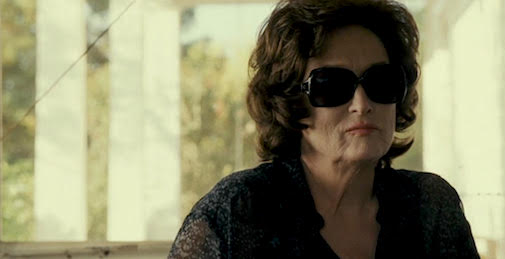
This makes her ongoing participation in stage-to-screen projects like Plenty, Dancing at Lughnasa, Angels in America, Doubt, and August: Osage County seem like fruitful attempts to fuse her two passions within the medium that made her a legend. These films haven’t always showcased Streep to her finest ability, a result of some dire collaborators, but also what comes across as Streep’s own hesitancy about how to best reconcile her natural instinct for the theatrical with the stripping-away of artifice that screen work usually demands. (To my mind, Streep’s tour de force in 1987’s Ironweed is her most inspired melding of these two performative strains.)
Streep received some memorable flack from critics like Stephanie Zacharek and David Edelstein, who threw her name into that year’s Razzie race, for the boldly-accentuated, attention-grabbing performance that she provides as a possible means of resuscitation to August: Osage County, which is not so much directed as supervised by television veteran John Wells. Despite its appropriately, intriguingly claustrophobic handling of the prologue, in which ill-fated patriarch Beverly (Sam Shepard) gives a hired Native American helper (Misty Upham) the lay of the land before Streep’s Violet wanders in and makes her presence palpably felt, Wells’ wan direction mostly consists of repetitive shot-reverse-shot set-ups and meaningless panoramas of rural Oklahoma.
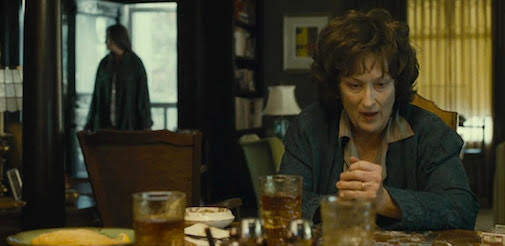
Letts’ drastically curtailed screenplay would have surely benefited from either a ballsier risk-taker or a more resourceful navigator of limited settings, but lucky for Letts, Wells, their collaborators, and those in the audience who prefer their performances nervy and their drama high, there is Streep. Intrepid and ingenious from the start, Streep announces her heightened intentions directly upon her arrival, letting loose with the first of a string of spittle-flecked, expletive-laden outbursts, in this case barking at Beverly, “Why don’t you go fuck a fucking sow’s ass?” in a voice thick with smoke and spite. There probably exists a more understated and deftly modulated take on this character in another actress’ arsenal; Spacek comes to mind, as do Blythe Danner, Cherry Jones, Alfre Woodard, and Joanne Woodward. But Streep’s relentless theatrics not only fit but enrich the outlandishly poisonous creation that is Violet Weston, fussily but always fascinatingly conveying the flawed, human dimensionality that other actors (like Juliette Lewis, as Violet’s flibbertigibbet youngest daughter Karen, and Margo Martindale, as Violet’s boorish sister Mattie Fae) keep insisting their characters possess.
Streep is working on a register unreachable by even the gamest and ablest of her scene partners, like Julia Roberts, who always plays a great prickly pear and whose hardened, foregrounded eldest daughter Barbara is maybe the true protagonist of this adaptation. Wells’ stagnancy of vision limits the variation of Roberts’ approach and curbs her willingness to take chances, but Streep continues to push and prod at the piece regardless of who’s behind the camera, courting our repulsion in a way that stays true to Violet. Streep goes big because she can and because a character who suddenly, shrilly, and inanely screams, “Where’s the meat?” at her own husband’s funeral dinner, for no other reason than because she can, merits the overstatement.
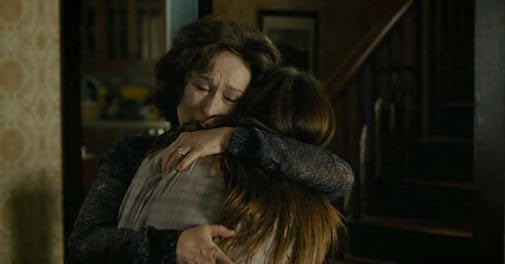
There’s a lot more in this performance to unpack, but what do you appreciate about Streep’s take-no-prisoners presentation?
JOHN: I’m glad you mentioned Ironweed; for me, Violet Weston is Streep’s grown-up variation of Helen Archer, swapping alcohol for pills and defined more by the weight of traumatic family history than the despondency of loneliness. Like Streep’s performance in Ironweed, her Violet is that unique melding of theatricality and interiority central to these types of characterizations. Violet clearly relishes her bouts of “truth-telling,” taking pleasure in any opportunity to relate the abuses of her childhood, spewing venom at her relatives in that thick Midwestern accent. But with Meryl, a monster is never really just a monster; there is equal parts pathos and villainy to Violet. Even in the centerpiece dinner scene, where Violet eats cigarettes as her insults cut as deep as an oil well, Streep suggests that Violet wants her children to bear her pain with her; her barbs are invitations to suffer the painful truths of disappointment and the inherited abuse that courses through their poisoned family tree. As dazed and incoherent as those pills make her, it’s even more terrifying to consider Violet as being considerably lucid and honest during her furious tangents. Streep forces the viewer to reckon with Violet’s pain, even when she’s inflicting it on others.
On the DVD’s making-of feature, Streep discusses what attracted her to Violet, aside from the obvious pedigree of the script and the juiciness of this coveted role. She speaks about how liberating it was to play a character so ferociously forthcoming, and that she felt immense freedom in airing the frustrations of a generation of women whose avenues were blocked, ambitions thwarted, and educations limited by the restrictive realities of being a homemaker. These unfulfilled women instead poured all their hopes and dreams into their children, only to inevitably find them a disappointment; their offspring’s relative adolescent comfort, poles apart from the impoverished childhoods of their parents, failed to ignite a drive for hard work and ambition. Streep’s performance illustrates one woman’s mission to detonate a hurt locker of pain at any cost; even if Violet can no longer distinguish frustration from outright resentment, Streep renders her emotional breakdown with supreme control and uncompromising honesty.
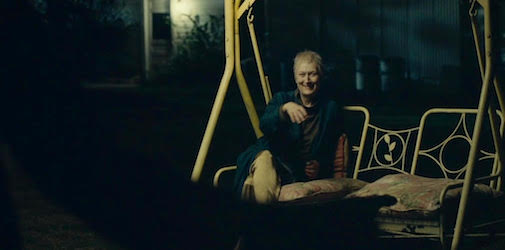
As big as Streep can go for most of the film, she knows exactly when to reign it in, change her delivery, and offer a necessary glimpse at Violet’s vulnerability. The entire performance comes together in a monologue that the character relates to her daughters on the porch. With her natural, balding blonde hair and her thin body pale as a glacier and wrapped in white, Streep calmly shatters the merciless portrait she had previously painted as Violet tells a devastating story about a pair of boots she wanted for Christmas as a young girl. Slipping completely into the memory, Streep’s happiness and girlish desire for these cowboy boots is immediately disarming; she transports the viewer back to those early memories while retaining the initial feelings of anticipation that her mother would buy her this cherished item. But we soon learn that her mother was a “nasty, mean old lady,” and instead purposely bought her daughter tattered, shit-covered shoes to dash her dreams come Christmas morning. What’s remarkable is the extent to which present-day Violet is actually able to deceive herself into thinking that those coveted boots might just be underneath the tree, only to have the truth of her memory devastate her — and us. This skillfully-played, pitch-perfect scene further complicates our sympathy for the character, but it also, in a sense, clarifies a great deal about her.
Streep’s wrenching monologue is a cherished outlier in what feels like an endless marathon of actors taking turns yelling, “What is wrong with you?” at each other. Supervisor John Wells fails to modulate the efforts of his talented actors to any notable effect, but Streep has at this point in her career learned how to more or less direct herself. Criticisms of her approach in August are sometimes valid — it’s not exactly a subtle performance, with some mannered, showy flourishes here and there — but most of these dismissals read like wholesale dismissals of melodrama and the kind of overly expressive acting that the genre requires. Let’s settle this: Is Meryl overacting here, or are disgruntled viewers unable to gauge the requirements and merits of her chosen method?
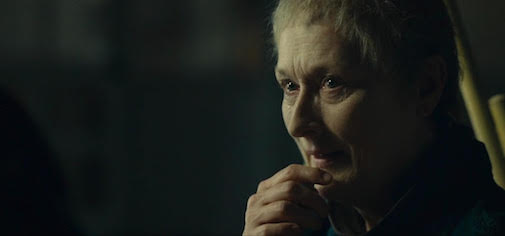
MATTHEW: Of course Meryl is overacting in August: Osage County, and bless her for doing so! Streep is the only consistent source of energy among this entire team of filmmakers, although the experienced editor Stephen Mirrione, a favorite of Steven Soderbergh, Alejandro González Iñárritu, and August producer George Clooney, sure does give her a run for her money, sloppily cutting together the whole thing like he was late for a meeting and refusing to let an eerie silence or painful pause linger. Unlike Wells, Mirrione, and countless others involved, Streep appears to have given every single gesture, exchange, and filleting zinger in Letts’ script its proper consideration and then found many a ways to amplify their significance through the physical and vocal transformations of her performance. In doing so, she makes us feel the emotional stakes of a story about a mother and daughter who have very little time for the feelings of others and bruise their nearest and dearest accordingly.
Through Streep, we see a Violet Weston who controls those around her like a wicked conductor, forcing them into playing all the expected parts in a warped familial symphony of her own making. Streep’s Violet tries to pass off her weaponized wit and destructive monstrosity as necessary survivalism when they’re really just products of her sick love of power; she is always scheming, always storing away information for later, devastating use, and always on the lookout for another body to push around, another spirit to wound. She fears the gaze of her family members drifting to someone else, depriving her of the attention that she ingests like a Venus flytrap, and will thus tell any tale and stack lie upon lie in order to secure it. The bold strokes of Streep’s performance are justified by the fundamental, oxygen-draining need of this character.
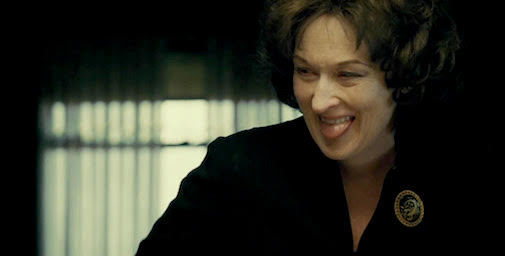
This is never more evident than in the centerpiece dinner scene, in which Streep is, as Chris Cooper’s Uncle Charlie declares it, “in rare form.” The actress makes a mesmerizing and often meaning-laden impression in her every frame, whether she’s glowering and slinging her arm over a chair with lethargic agitation as Charlie says a fumbling, impromptu grace or darting the two beady, almost jet-black pupils that sit in her sockets with comprehending concentration from middle daughter Ivy (Julianne Nicholson) to Little Charles (Benedict Cumberbatch), the first cousin much closer to her own brood than initially assumed. In one close-up, Streep’s eyes sparkle with malice when Barbara tattles on her daughter’s lapses in vegetarianism, recognizing and appreciating a fellow master manipulator who sees everything and forgets nothing, perhaps even relishing the fact that this particular one was brought into the world by her. In moments like these, Streep manages to authenticate Letts’ calculated thesis that the sins of the mother are reenacted by the daughter and implant it within what might have been nothing more major than a throwaway piece of multigenerational interaction.
Streep excels most in the moments where Wells isn’t effortfully trying to cinematize Letts’ play, but she occasionally pays the price for his dubious choices. When the family receives word of Beverly’s death, Wells turns up the volume on the Eric Clapton record that Violet has put on as she spirals out of control, drowning out and idiotically drawing our attention away from Streep’s groggy, inarticulate dumb show, which captures more of Violet’s delirious state of mind than any soundtrack cue ever could. Streep is also forced into selling a ridiculous scene in which Violet runs for her life through a field of hay rolls, which directly follows a visit to Violet’s enabling doctor, the two moments comprising a needless opening-out of this essentially domestic drama.
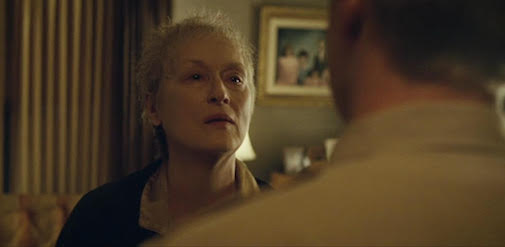
There are certain instances where I can understand why Streep’s characterization is just too much for some viewers, like when Violet gnaws on her curved pinky finger in the back of Barbara’s car or staggers around her house in a pill-induced stupor with the clumsiness of a tyke just finding her footing. But so much else in this interpretation suggests the riveting, unsentimental adaptation that might have been, one marked not only by entertaining intramural bickering but by the troubling poignancy that Streep summons up in her best moments. Violet’s monologue about her mother’s cruel Christmas prank is indeed as devastating and indelible as you mentioned. Streep grabs ahold of Letts’ words and comes alive with something like sensory remembrance, deepening the character by foregrounding her core contradiction as a woman of tough carapace and flinty demeanor who rebukes the pity she can’t stop inviting.
Like the greatest and purest of screen actresses, Streep doesn’t require pages of evocative speech to achieve this effect. The tragedy of Violet Weston is evident early on, staring back at her as Streep cocks a girlish pose and juts out an angular arm while staring at herself in the mirror, draping a slinky dress over her shrunken frame. Maybe she’s remembering the knockout beauty she was in a past life or just seeing past the haggard, withered skeleton that disease, spite, and the passage of time have made of her. Either way, she has our attention.
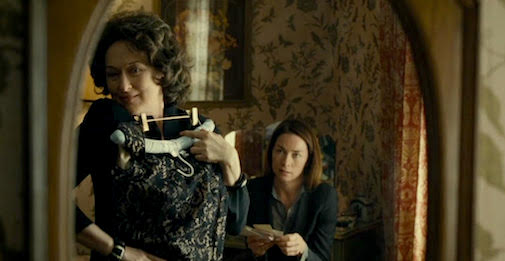



Reader Comments (78)
I was aware that Streep received some flack for this performance and that the film has its fair share of detractors.
I was lucky enough to see it on Broadway (with Parsons). I'd agree that the direction of the film is unremarkable, but the material itself is so powerful and the lead performances so good that it kind of didn't matter to me--I was completely engaged. I thought Streep was great here, and I was actually SUPER impressed with Roberts. I thought she more than held her own with Streep and actually felt that she matched her with an intense and piecing performance.
I actually really like this film.
This is simply awful, Meryl at her very worst. Such a shame she wasn't snubbed by the Oscars. Big, grating, obvious, empty.
I preferred the quietness of Cooper and Nicholson to Streep who has great as well as god awful moments.
Obvious? That's what I expected to get when I've read about this, but color me surprised Violet Weston was NOT the fire breathing Dragon I imagined.
She's a monster, yes, but there are a lot of back stories (the attack on her with a f*cking hammer! or that boots monologue) we... or at least I can see why she became it.
Barbara is also quite aggressive to her husband and daughter, so it's somehow a spiral...
It's not perfect, but better than I expected. There are loud but also a lot of quiet and heartbreaking Moments (poor Ivy...)
I still think Weistein had this for Meryl's third win in mind. How else do you explain the relase of the Project one day after Oscar votes closed in 2012? Coincidence? Maybe, but I don't think so.
I need to see it again. I saw it just after the nominations came out and I was so resentful that she had squeezed out Emma Thompson that it probably colored my judgment. That, and I found the whole film pretty grating. "Big" flamboyant performances can go either way with me, and it's possible seeing it again would change my opinion from a "no no no for the love of God no" to a "yes it's just what the role needed".
This movie to me is kind of a mixed bag. I actually like all the actors (except Julia Roberts), and I will always wonder what kind of movie this would have been with Streep and Laura Linney as Barbara, directed by a Mike Nichols or Paul Thomas Anderson. It seems like it got the sunny TV movie treatment, and the tone veers wildly from silly to scary to sunny (the tacked on ending, at Julia Roberts' request, is awful). But I love the text, and most of the actors. Certain scenes, like the dinner scene or boot scene, are fantastic and riveting.
I love how Jb above clearly didn't read this great piece.
Underrated film and superb Streep performance. If only this had come out in 2011 instead of "The Iron Lady!"
My compliments to you both for such an interesting write up. I thought Meryl Streep was perfect for this part, but I was bothered by the insipid direction, clunky editing and cinematography, and by some poor casting choices. I thought Ewan Macgregor and Benedict Cumberbatch were mediocre and terrible respectively.
I found myself constantly wondering how much better Robert Altman would have handled this.
Also, as a repressed Canadian wasp I find the whole genre of American Southern Gothic awfully hard to believe and take seriously. I realize that I'm showing myself to be some sort of philistine and that the play is considered a masterpiece, but it just doesn't resonate with me. If someone erupted like that at a dinner in our household they would be given a puzzled look and asked (politely) if they wanted to go upstairs and lie down.
It makes great theatre but it just never feels like real life to me. (just my humble opinion)
Btw. Margo Martindale said the cast had great potluck dinners during the filming. I wish I could see a film of just one of those dinners instead of this film.
Nicholson > Streep and Roberts
I saw this after it came out on DVD and I just didn't like it at all. I thought Streep came off as ham-fisted and the story over-wrought. Quite frankly I can barely remember anything about it at all today!
This is, for me one of the most disappointing movies ever made. The play is just on fire for all three hours and it deserved maximum talents behind the camera to capture it. It feels compromised in almost every way a piece of art can be compromised...
that said I appreciate this discussion because, though I was disappointed in Streep's work, this article has a lot of fascinating points about what she does right within this gargantuan role.
Oh, this is THAT movie!
That year, Emma Thompson had made a movie with Tom Hanks (who played Walt Disney) about the production of “Mary Poppins”. Emma was considered to be a pretty sure thing for one of the 5 Best Actress nominations.
There was a dinner honouring Emma, and she had asked her friend Meryl to speak. Meryl’s speech completely eviserated Walt Disney as an evil scourge of mankind. And how terrible it was that dear Emma had to be in a movie about this awful person (although really Emma should have known better).
It wasn’t really what anybody had expected. They had expected her to say nice things about Emma, as her friend, not tear apart Emma’s latest movie. Then everyone was nervous about the Disney movie and didn’t feel they could vote for it.
So Emma lost her nomination. And when they were looking at possibilities for that fifth spot, well oh my goodness, how about Meryl, who had never really been considered in the top five?
I read that Emma Thompson sent Meryl a one word message for her speech:
“Thanks”.
I want invite you all to see the version for adults, Arnaud Desplechin's A Christmas Tale, in which Catherine Deneuve delivers a masterclass in how to play a character like Violet.
adri
And yet Meryl Streep is now in Mary Poppins Returns!
Meryl should have never gotten this role. Oh what it could have been, even with the awful director, with an actress that understood the character and didn't play it scene by scene, chewing the scenery and not letting the ensemble breathe.
And if she loves the theater so much she should try doing it instead of stealing these roles. Same thing with Doubt, another insipid performance from her.
Oof. Having seen the play on Broadway I had high hopes for this - but they were crushed. The film looks bland and Streep, well, disappointing is the nicest word I can think of to describe her performance. And cal roth raises a good point/comparison - A Christmas Tale/Deneuve are far superior.
Doubt and AOC are the two roles for which I kept thinking wouldn't someone else have played it as less of a gargolye.
+1 Andrew C. Nicholson is the MVP of this for sure.
Meryl Streep the most miscast screen actor of all time. Had another actress been cast they would have been competition for the eventual winner. With Streep just a missed opportunity and a redundant nomination to inflated legacy that can be thrown in the garbage with Bill Cosby's artistic contributions.
ken s: omg!
You are so right!
ahahahaha!
There are words to describe that ...
This movie is so loud and annoying. A female director like Andrea Arnold or Lynne Ramsay would have been a much better choice. To me Julia Roberts is on fire! Roberts should most def been nominated in best actress
Violet could have been played by: Kathy Bates, Glenn Close, Angelica Houston, Susan Sarandon, Ellen Burstyn, Charlotte Rampling,
I remember leaving the theatre after having watched this and feeling very disappointed... and finding most everything about the film entirely forgettable, that is - except for Julianne Nicholson. I'll never understand how a performance like hers here ccould be entirely ignored... while lesser performances, even from the same film, somehow managed so much recognition...
Wow. Streep brings out the lunatics.
Streep is entertaining and ridiculous in this. The whole movie feels like something with an obvious expiration date (the end of the 2013 Oscar season). A shame because the play is so highly esteemed. I preferred Roberts in the film, and Martindale was like a scene away from being the MVP.
adri - Thank you for reminding us about that. That’s so Meryl, so competitive.
Ultimately, another great year for actresses, another year Streep took up a spot and we learned again not to bet against her.
Adèle Exarchopoulos, BLUE IS THE WARMEST COLOUR
Cate Blanchett, BLUE JASMINE
Paulina García, GLORIA
Julie Delpy, BEFORE MIDNIGHT
Scarlett Johansson, HER
Brie Larson, SHORT TERM 12
Greta Gerwig, FRANCES HA
Cristina Flutur & Cosmina Stratan, BEYOND THE HILLS
Julia Louis-Dreyfus, ENOUGH SAID
Does anyone really believe that Meryl Streep purposely sabotaged Emma Thompson, or presume to know what exactly their friendship is like? Is this the new era of crazy conspiracy thinkers?
@Jb and /3rtful
If you knew anything about movie making or the role of Violet in the play, you could expound on the subject. I taught Letts' play at a college level American lit class.
I saw the play on Broadway with the two afore mentioned actresses.
The part calls for an out of control interpretation. You might not like the theme ( it definitely is not everyone's cup of tea ), but for the MOST part Streep nailed the violet character.
Yes, many elements were not good in the film. The ending in the movie just destroyed the whole movie. It did not end that way in the play. It ended with Violet in the caretaker's arms.
Jb and /3rtful... Yes, you hate Streep ( obvious in everything you write ) so your comments mean little or nothing.
Damn, Jessica Lange, Kathleen Turner or Marsha Mason would have been perfect for Violet. Sigh.
rdf - rumors are that Streep fought for that ending...and lost.
I would have preferred a different actress because I don't Meryl to play all the great female stage roles of the last two decades. Having say that, I think she absolutely nails all her monologues, the loud ones (dinner table) and the soft ones (the boots).
@Adri https://www.vanityfair.com/hollywood/2014/01/meryl-streep-emma-thompson-best-speech-ever - here is the speech you speak of - I think you're exaggerating the whole thing to be perfectly honest - I wouldn't say Emma lost her nomination to Meryl - I still argue Amy Adams was the 5th place nominee/unexpected surprise.
I love this movie - never seen the play but lord Meryl goes big - Julia Roberts is still my MVP here, I'd never seen her play someone I thoroughly disliked and it took real talent to make her character that way.
As if Meryl's Oscar nomination for this movie were ever in doubt and she had to "steal" a nomination from Emma Thompson. morganb is right, American Hustle premiered at the last minute to great critical and popular acclaim, and Amy Adams snuck in.
August: Osage County was popular enough that Roberts was nominated in a stacked year in Supporting Actress, while Tom Hanks couldn't get nominated in Supporting Actor for Saving Mr. Banks (though I suppose the delusional will blame that on Meryl, too).
American Hustle had 10 nominations, including her 3 co-stars. It was a box office smash. Do you really think Amy Adams' position was that precarious?
Thanks BC. I had never heard that.
Her performance in this gets better and better after each viewing. I think she is playing over the top and big but that is who Violet is. Wish Mike Nichols would have directed this though.
And yes, I totally believe that Meryl so desperately wanted a 18th nomination that she chose to talk about Walt Disney’s past history just to make Emma lose out....... GEEZ FOLKS! Get a grip!
@Ken S. It wasn't so much in doubt rather that there was six big contenders fighting for five slots and everyone assumed that it was Amy vs Meryl for the 5th slot - if I remember rightly, Emma was considered to be almost a lock and it was a surprise when she lost out and both Meryl and Amy made it in. (even though nothing should surprise us about Meryl anymore) - American Hustle was also the last release I think and surprised everyone with how well it did - lest we forget Jacki Weaver being the surprise of all surprises on nomination morning.
https://www.theguardian.com/film/2014/jan/21/meryl-streep-emma-thompson-oscar-snub
Also - I think that's the letter you're referring to and knowing Emma Thompson - it's perfectly in line with her sense of humour and general 'fuck the establishment' attitude - nothing meant by it, no dramas and stop pitting women against one another. etc. etc.
Violet Weston would be proud :D
Of the significant play-turned-films (excluding musicals and Shakespeare) of the last 20 years, these are my favorites:
1. Closer (Mike Nichols knew what he was doing.)
2. Rabbit Hole (So does John Cameron Mitchell.)
3. Bug (Total thematic outlier)
4. Carnage (Fun ensemble piece and rare comedy from Jodie Foster)
5. Proof (Works as a character study)
Doubt, Frost/Nixon, Fences and others run into the same issues that musicals do: Strong performances, but can't rise to meet the standard of "great filmmaking." August: Osage County falls somewhere way behind even those.
morganb - I think that's a pretty accurate analysis. Going in, I thought the nominees in order of probability were 1. Cate Blanchett (who, let's face it, was always going to win it 2. Sandra Bullock 3. Emma Thompson 4. Amy Adams 5. Judi Dench, with the last two gaining momentum daily. Because of the unenthusiastic reviews for both Meryl and the film itself, I thought she'd be odd gal out. Boy was I wrong. And lest anyone think I blame Meryl for backstabbing her way into the final five, I don't blame her at all. I blame the lazy Actors' branch, for their rote choices, for example, not only for choosing Meryl over Emma, but not even considering Julie Delpy for Before Midnight, among other more deserving candidates.
Terrible performance. I think she goes for every obvious choice and it's deeply uninteresting.
I don't think HW people liked Saving Mr. Banks. Tom Hanks was also not nominated.
I was also not as captivated by Meryl's Violet in this screen adaptation of Tracy Letts' play, but as one of you pointed out, maybe Violet is supposed to be unpleasant and emotionally violent and maybe Meryl's delineation was true to form. I need to see it again. But if it weren't for this movie I would not have encountered the heartbreaking portrayal of one Julianne Nicholson. She is similar to Anne Consigny's character in A Christmas Tale (thanks for the shout-out for this marvelous film).
Tracy Letts was heavily involved in this production, and he seems to be totally fine with Streep's interpretation. I think the performance pushes people's buttons because Violet is so repugnant. She's terrible and unrelentingly terrible. There will always be people who have a chip on their shoulder about Meryl, but no other actress can immediately bust out as many emotions and comments as she does. She also elevates everyone around her. My issue was John Wells. He bought the rights for himself to direct? I can't remember how he ended up with it. His background was directing TV shows.
Now I'm mixing my David O'Russel films up :D Jacki Weaver was the year before - duh haha
This role would have been so much better in Glenn Close hands ....
Watching this, I thought, what I l wouldn't give for Female Trouble-era Divine and Mink Stole instead of Streep and Robert's.
I'm probably all alone on that one.
I very much expected to love this movie and I very much did not. That said, it's hard to deny the merits of Streep's performance (despite how many here seem to try). As others have pointed out, this was a very strong year for best actress (aren't they all these days?), and I was gobsmacked by Thompson's omission (one of the worst snubs of the last 10 years for my money). In a perfect world, she would have made it in over Meryl by virtue of the fact that she gave a memorable, nuanced performance in a much better, more accessible, more likable film. But the suggestion that any number of other actresses could have played Streep's role in August better than her? Give me a break. I really did not like this movie, and I think a number of other actresses did subtle, special, enduring work that year more deserving of recognition. But it's not because Streep was bad, or even that she could have been better. It's because this was a difficult, unrewarding, exhausting film and Violet is a difficult, unrewarding, exhausting character. No other actress cast in that role in that film would have been nominated that year. Meryl got in because she's Meryl, and others were left out because they're not Meryl. That's the hard truth, and it's a shame. But I'm really not interested this kind of vitriol directed at the woman who is, in my opinion, the greatest film actress of all time, to the extent such a title exists, and who was not bad in this movie. Look at your life, look at your choices.
I had the fortune of watching the play twice when I was working in the US with the two latter actresses mentioned. Yes the play was way better than the movie but Meryl nailed the part in my opinion so I don't quite understand the hatred towards her performance by some here. This CANNOIT be a nuanced subtle performance. Even if Glenn Close or some other actresses were to play this, it would be BIG or as some had commented here 'ham-fisted'. And no offence to Nat or any critics, don't always trust them for their judgement. Believe in your own faculty! So yeah, I thought Meryl was great here.
I agree that this character has to be played big and crushing. Still, there is indeed such a thing as TOO big. And this is that. And to say a big interpretation doesn't have room for nuance is incorrect.
Ofc the role is big and loud and should be played like that. No one expects a study in subtlety from Violet Weston but Meryl totally botched the character. She has some good moments but basically misunderstood what made her tick, had 0 chemistry with her daughters and literally just screamed her way through a lot of scenes with 0 nuance. Martindale knew who she was playing and sadly was absolutely short-changed by the script, Nicholson is a revelation but the rest of the cast was a disaster.
When the play premiered, it was quite the sensation. It was THE thing in the 2007-08 Broadway season and won the second-most number of Tonys that year (it won 5 and the revival of South Pacific won 7), plus the Pulitzer.
But it's kind of been left behind since then. It's rarely produced regionally, despite a plethora of meaty roles for the sort of middle-aged white people that make up such casting pools, and seldom discussed much. I can't help but wonder if the movie- which is also seldom discussed much- had a chilling effect on it.